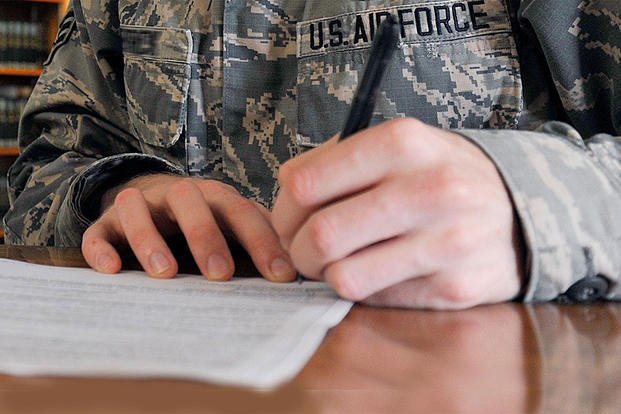Have you ever asked, "Can I get out of this lease?"
Maybe your circumstances have changed and your place no longer fits your needs or budget. Maybe you hate your neighbors, landlord or both. Maybe life on base is looking better than life off. Or maybe the military has done what the military does and given you surprise orders.
Related: Get your homebuying edge. Local expertise. VA specialized. Go-to agents for veterans and military families.
But can you get out of your lease without huge fees?
It's a question I get a lot as a Legal Assistance Officer. And the answer is "maybe."
But first a disclaimer: Every state has different laws and every situation is unique. The important lesson here is to think of this post as an introduction and not as specific advice, except for the following: your local base will have a legal assistance office that can provide you with clear and informed advice tailored to your specific needs. Don't hesitate to reach out to them. And if you are not located near a main post or base, try to find your State's National Guard Family Assistance Center. They are a great source of resources.
What a lease means to you.
At its heart, a lease is simple agreement between the renter and the landlord. The renter gets the unhindered use of the property sometimes subject to a few conditions, and the landlord gets a guaranteed income stream. It is a binding contract that guarantees you a place to live in exchange for guaranteed payments.
That means that if you move out mid-lease, you are likely still on the hook to pay your rent for the remainder of your lease, but it one month or 10. That is, unless you have a "military clause" in your lease that lets you out or -- and it is an "OR" not an "and" - military orders.
Why orders get you out of a lease
If you have orders for either a PCS or a deployment longer than 90 days, federal law allows you to terminate your lease.
Let me be clear here, because I still encounter a lot of confusion from landlords about this. Federal Law, 50 U.S.C. App. Section 535, known as the Servicemember Civil Relief Act (SCRA), provides this right to men and women in the military and their families. If you are have orders it doesn't matter if you have a military clause in your lease or not - you are off the hook.
But to use it you have to follow specific procedure. Here are the details:
- You must provide written notice of your intent to invoke your rights under the SCRA to your landlord as well as a copy of your orders. Orders haven't come through yet? Ask your commander for a letter telling you that you are receiving PCS orders.
- Know that the timing can be tricky. Your termination becomes effective 30 days after the next rental payment is due. That means that if your rent is due on the first of the month, and you deliver your notice on March 7, the termination date will be April 30th.
- The landlord can't penalize you and must return all rent collected for periods after the termination date. They can challenge the justice of it in court, but you are highly likely to win if everything on your side is honest.
- This applies to both the service member and spouse, even if both names are on the lease. However, for SCRA protections, the service member's name must be on the lease. If the lease was signed in his or her name with a power of attorney, the service member is covered.. It does not cover a fiancé or a friend. In that case you'll have to see if state law in your area does. Some state laws and many courts will, in practice, extend SCRA protection when the lease was for the use of the service member even if he or she is not on the lease.
So what about a military clause?
A military clause may change the agreement between the parties, but unless waived in a separate and clearly marked agreement, the rights we just talked about are still there. Military clause or not, if you have orders the SCRA covers you.
What a military clause can do is give you more rights or lay out a more user friendly way to invoke your SCRA rights. It could, for example, allow to break your lease if you were to receive on-base housing.
By and large, most military clauses are left over from the days before the rights discussed above were written into law. Look at them closely, and don't hesitate to ask for one that includes situations you expect to encounter (like base housing coming open).
What happens if I break my lease without orders or a military clause?
There are some other limited circumstances you can break a lease, but generally, if the landlord is reasonably living up to his end of the contract you have to live up to yours. And that means that if you break your lease without orders or a legitimate out in the form of, for example, a military clause, expect to be held liable for the entire remainder of the term of the lease, even if you move out.
Break a lease the wrong way, and it can get very expensive, very quickly. You really need to consult with an attorney before you break a lease without the landlord's agreement. Landlords, however, tend to be reasonable people. If approached nicely but firmly, they will often agree to a necessary modification, especially if the law is on your side. Generally, a negotiated agreement beats a court fight any day.
Having doubts or just want to make sure you're in the clear? Consulting your local legal assistance office before making big decisions about your lease can save you a lot of time and money.
Captain Matthew "Matt" Reid, is an Army Judge Advocate currently acting as the full time Legal Assistance Officer in Rhode Island. Prior to direct commissioning into the JAG Corps, he served as an enlisted intelligence analyst for 10 years.
Keep Up With the Ins and Outs of Military Life
For the latest military news, videos, tips on military family benefits and more, sign up for a free Military.com membership and have information delivered directly to your inbox.









